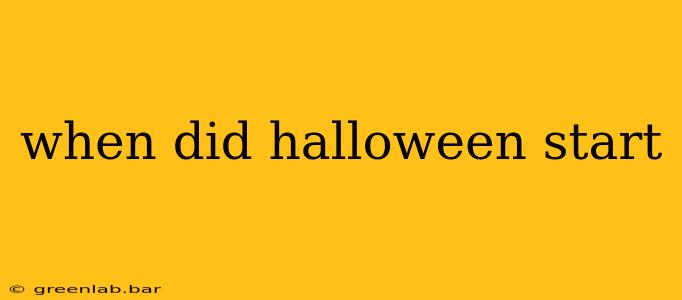Halloween, that spooky celebration filled with costumes, candy, and jack-o'-lanterns, has roots that stretch back surprisingly far. While the modern traditions we associate with Halloween are relatively recent, its origins lie in ancient Celtic harvest festivals and evolve through centuries of cultural blending. Let's delve into the fascinating history to uncover when Halloween truly started.
The Ancient Roots: Samhain and the Celtic New Year
The most widely accepted origin of Halloween traces back to the ancient Celtic festival of Samhain (pronounced sow-in). Celebrated by the Celts who lived 2,000 years ago in what is now Ireland, the United Kingdom, and northern France, Samhain marked the end of summer and the harvest and the beginning of the dark, cold winter—a time of year often associated with death.
Celts believed that the boundary between the worlds of the living and the dead became blurred on the night before the Celtic new year. This night, which fell around November 1st, was considered a time when ghosts returned to earth. To commemorate this liminal space, Celts built bonfires, wore costumes to ward off evil spirits, and practiced divination to glimpse into the future.
This period wasn't about fear; it was about acknowledging the cyclical nature of life and death, embracing the mysteries of the afterlife, and preparing for the winter months ahead. While certainly spooky by today's standards, the original Samhain was deeply rooted in spiritual and agricultural practices.
The Influence of Christianity: All Saints' Day and All Souls' Day
The arrival of Christianity in Europe significantly impacted the celebration. Pope Gregory IV designated November 1st as All Saints' Day (also known as All Hallows' Day) in the 9th century, a day to honor all Christian saints. This day, positioned close to the date of Samhain, effectively absorbed and Christianized many of its traditions.
The following day, November 2nd, became All Souls' Day, dedicated to praying for the dead. The combination of All Hallows' Eve (the evening before All Saints' Day) and the existing Celtic traditions solidified the foundation for what we know as Halloween.
Halloween's Evolution Through the Ages: From Superstition to Celebration
Over the centuries, Halloween's traditions continued to evolve. The practice of "guising," where children and adults would dress in costumes and go door-to-door for food or money, became prevalent, particularly in Scotland and Ireland. This practice, although transformed over time, is a clear precursor to the modern-day trick-or-treating.
The mass migration of immigrants from Europe to North America in the 19th century brought Halloween traditions with them, further shaping its modern form. The merging of Celtic, Christian, and immigrant cultural influences led to the diverse Halloween we celebrate today.
Modern Halloween: A Global Phenomenon
Today, Halloween has transcended its origins, becoming a globally celebrated holiday. While the spooky aspects remain central, the emphasis on costumes, candy, and parties has become more prominent than the original spiritual significance. The holiday's evolution showcases the power of cultural fusion and the enduring fascination with the interplay between life and death, the past and the present.
Conclusion: A Continuous Evolution
So, when did Halloween start? The answer isn't a single date, but rather a long and fascinating journey spanning millennia. From the ancient Celtic festival of Samhain to the modern-day global celebration, Halloween's origins and evolution reflect a rich tapestry of cultural beliefs and practices, showcasing the enduring power of tradition and adaptation. While the costumes, candy, and trick-or-treating might have changed, the underlying themes of acknowledging the cycles of life and death, and the connection between the living and the departed, continue to resonate today.

